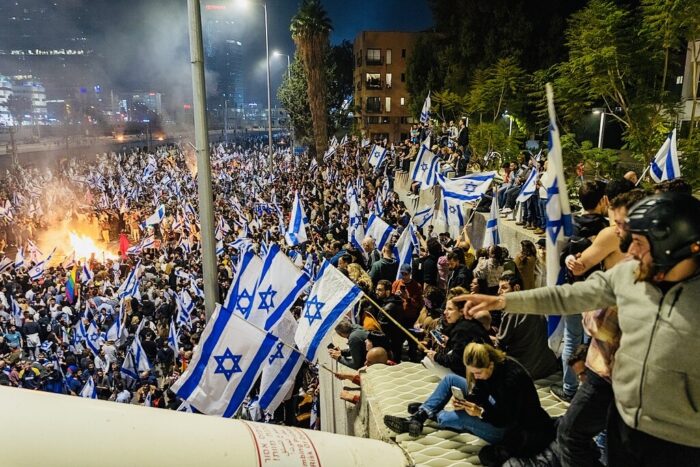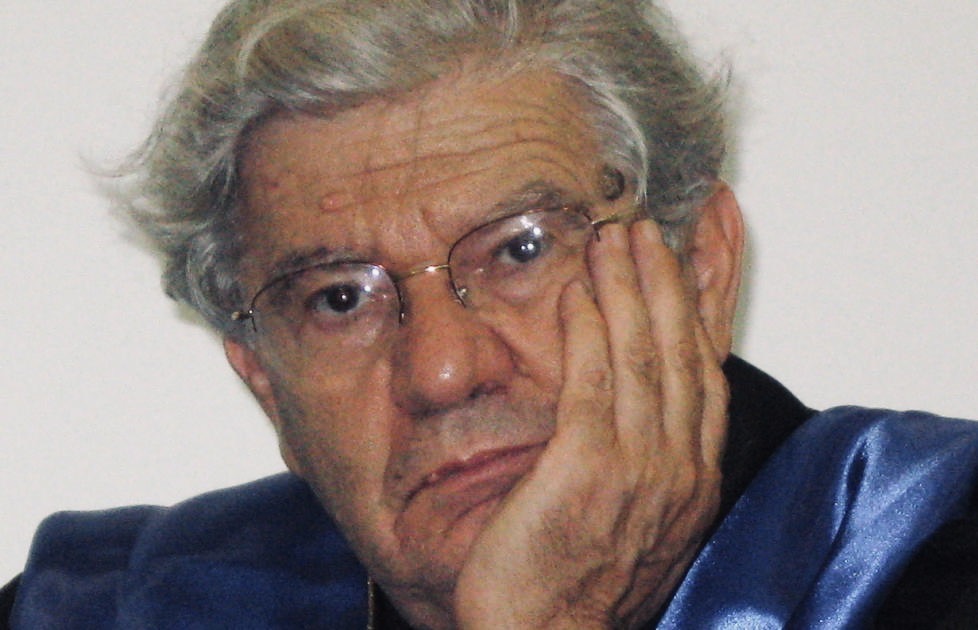Israel has never been as internally divided as it is today.
The divisions that are tearing Israel apart could, in the worst-case scenario, lead to something approaching a civil war.
The current tensions have been compared to the disastrous conflicts that preceded the Roman conquest of Jerusalem and the destruction of the Second Temple in 70 CE. This may seem like an overdrawn comparison, but most Israelis would agree that the degree of polarization in Israeli society has reached alarming and dangerous proportions.
The rifts remind observers of previous strife. Israel’s decision to open diplomatic relations with West Germany in the mid-1960s caused an immense uproar. The Oslo peace accord in 1993 split the country into irreconcilable factions.
Most observers would agree that the current infighting in Israel encourages and emboldens its enemies: Hamas in the Gaza Strip, Hezbollah in Lebanon, the Islamic fundamentalist regime in Iran, and the Houthis in Yemen.
The internal and external conflicts are unfolding at a fraught juncture, when Israel is still embroiled in its longest ever war. After 18 months of warfare, Israel has launched a fresh offensive in Gaza to destroy Hamas, a resilient enemy that refuses to surrender despite its huge losses in men and materiel.

As usual, the rot that is eating away at Israel starts at the top.
Benjamin Netanyahu, Israel’s longest-serving prime minister, was indicted on three counts of corruption — fraud, bribery and breach of trust — in 2020 by the attorney-general he appointed. He denies these charges and stubbornly refuses to resign, much to the disapproval of a significant proportion of the population.
Since then, he gone on trial, the first and only prime minister who has ever been put through this embarrassing and humiliating ordeal. In a normal democratic country, a politician in his shoes would have had the grace to step down. But not Netanyahu, whose priority is political survival.
And now Netanyahu is enmeshed in a new investigation concerning two of his aides, who have been accused of receiving payments from Qatar government officials and leaking classified information to a foreign newspaper.
Netanyahu has denounced the probe as a “witch hunt,” while Qatar, an Arab state that does not have formal diplomatic relations with Israel, has dismissed it as a “smear” campaign to undermine its role as a mediator between the Israeli government and Hamas.
Israelis were swift to form a united front after thousands of Hamas terrorists attacked southern Israel on October 7, 2023, killing roughly 1,200 people and kidnapping 251 Israelis and foreigners. But since that unprecedented massacre, which sparked the Israel-Hamas war, national unity has frayed and Israelis have turned on themselves in bitter recriminations.
Polls indicate that about 70 percent of Israelis no longer trust Netanyahu and his right-wing coalition. They call for the release of the remaining hostages and an end to the war, even if Hamas is left standing and continues to govern Gaza. In support of these demands, they have staged nation-wide protests that have further sundered the country.

As the Israeli army expanded its renewed offensive in Gaza on April 2, The Hostages and Missing Families Forum expressed indignation. “Has it been decided to sacrifice the hostages for the sake of ‘territorial gains?’” it asked in a pointed statement. “Instead of securing the release of the hostages through a deal and ending the war, the Israeli government is sending more soldiers into Gaza to fight in the same areas where battles have already taken place repeatedly.”
Netanyahu’s critics, who dislike or hate him with a passion, have accused him of needlessly prolonging the war so as to preserve his government, which has a slight majority of seats in the Knesset.
Two of his coalition partners, Finance Minister Bezalel Smotrich of the Religious Zionist Party and Itamar Ben Gvir of the Jewish Power Party, have threatened to bolt if he agrees to a long-term truce without first destroying Hamas, whose stated objective is Israel’s destruction.
The war in Gaza has caused weariness in the ranks of reservists, some of whom have refused to report for duty. This comes at a moment when tens of thousands of ultra-Orthodox yeshiva students, many of whom are anti-Zionists, are still scandalously shirking military service.
In accordance the new draft law, 10,000 have received conscription orders since last summer, but only 205, or 2 percent, have actually enlisted.
The haredim who refuse to serve need not worry. They can go on with their lives, secure in the knowledge that their rebbes are fully behind them, and that the government will not punish them because of its dependence on two haredi parties in the coalition.
Nonetheless, their blatant avoidance of military service has stirred widespread anger, resentment and rage, at a time when the army is short of manpower.
Amid this turbulence, Netanyahu has resurrected a highly divisive plan to overhaul the judiciary. When he introduced his proposals in early 2023, Israelis took to the streets in anti-government demonstrations. These protests buoyed Israel’s enemies, who falsely likened Israel to a fragile spider’s web ripe for the picking.

Netanyahu and Justice Minister Yariv Levin justified the overhaul on the grounds that the judicial system was elitist and had struck down a raft of laws, thereby negating the will of their constituency.
Netanyahu’s opponents, mainly secular Jews, accused him of trying to weaken the Supreme Court, concentrate power in the executive branch, and dilute democracy.
With the outbreak of the Gaza war, Netanyahu suspended his controversial program to reshape the judiciary. But late last month, he was back at it again. In a Knesset session boycotted by the opposition, the government enacted legislation giving it more power in the selection of judges.
Netanyahu’s move is bound up with his determination to sack Ronen Bar, the director of the Shin Bet internal intelligence agency. Netanyahu says he has lost trust in him. The Supreme Court is scheduled to hear petitions against his removal next week.
Netanyahu also wants to fire Gali Baharav-Miara, the attorney general who was appointed by his predecessor. Netanyahu regards her and Bar as enemies because they have questioned the legality of some of his policies.

“The leftist Deep State weaponizes the justice system to thwart the people’s will,” Netanyahu said the other day in response to critics who claim that his real objective is to concentrate power in his hands.
The turmoil that besets Israel is a source of angst to Israel’s former Supreme Court president Aharon Barak. He fears that Netanyahu’s judicial overhaul, if successful, could lead Israel to autocracy and possibly even civil war.
“The main problem in Israeli society is … the severe rift between Israelis,” Barak said last week. “This rift is getting worse, and in the end, I fear, it will be like a train that goes off the tracks and plunges into a chasm, causing a civil war.”
While Israel is nowhere near a civil war, it finds itself in troubled waters. As former Israeli prime minister Ehud Olmert said recently, “The foundations of the state are shaking.”
Olmert’s observation should be taken seriously.
